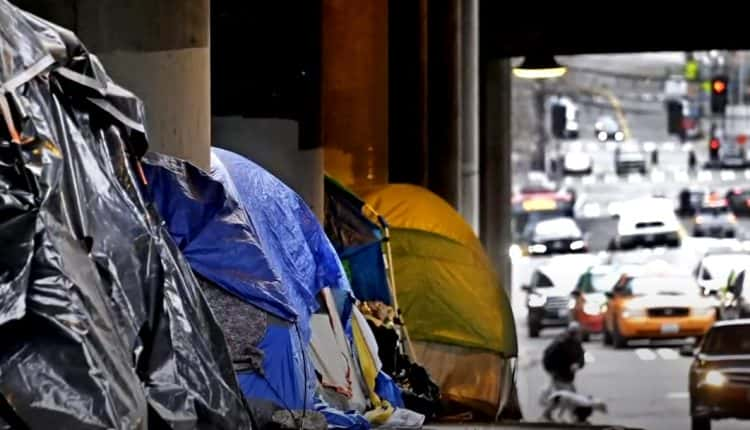
Homelessness in the United States has reached a troubling pinnacle, as recently unveiled data from the federal government reveals a record high in the number of individuals experiencing homelessness. In this disheartening scenario, Indigenous people find themselves disproportionately represented among those without a place to call home.
The Chief Seattle Club, a nonprofit organization dedicated to serving Indigenous people in Seattle, is currently grappling with the impending expiration of a permit for Eagle Village, a homeless shelter managed by the organization. This development raises concerns that residents, predominantly Indigenous individuals, may once again face the harsh reality of homelessness.
Impact on Indigenous Communities
The Department of Housing and Urban Development’s annual homeless assessment report highlights a stark reality — homelessness has surged to its highest reported level since 2007, with a 12% increase between 2022 and 2023. Disturbingly, Indigenous people continue to be overrepresented in this data, experiencing an 18% increase in sheltered homelessness within a single year.
While constituting only 3% of the total homeless population surveyed, Indigenous individuals face a disproportionate struggle for shelter.
The dire situation is particularly pronounced in King County, where Seattle is situated. Anne Martens, senior director of communications at the King County Regional Homelessness Authority, notes that Native or Indigenous individuals constitute between 9% and 15% of the homeless population in the county despite making up just 1% of the total population.
The need for increased capacity and culturally relevant services for Native/Indigenous people experiencing homelessness is evident. Unfortunately, only 84 out of the county’s 5,369 shelter beds are culturally specific to Native people.
Chief Seattle Club, specializing in addressing the high number of single adults experiencing chronic homelessness in the Indigenous community, manages crucial shelters such as Raven Village and Eagle Village. The latter, set to close in March 2024, plays a vital role in keeping individuals engaged with case managers, providing essential life skills, and fostering community values.
Culturally specific shelters are crucial, as they bridge the trust gap that often exists between Indigenous individuals and mainstream providers. Eagle Village faces an uncertain future as the property’s special-use permit, granted by King County Metro in 2019, is set to expire.
The intention to repurpose the property for parking non revenue vehicles has raised fears among Chief Seattle Club members that residents might be forced back onto the streets due to construction delays and leasing compliance issues.
Read more: Meteor Shower Calendar 2024: Plan Your Nights Under The Stars
Homelessness Amidst Seattle’s Shelter Crisis

Derrick Belgarde, Executive Director of Chief Seattle Club, emphasizes the necessity of an extension to avoid pushing residents back to homelessness. He calls on King County Metro to find alternatives, suggesting that if they need a parking lot, there are numerous vacant spaces in the area.
The organization plans to request another extension to safeguard the well-being of those relying on Eagle Village for support and stability.
As the struggle against homelessness intensifies, the plight of Indigenous individuals in Seattle underscores the need for culturally specific shelters and the importance of securing extensions for vital facilities like Eagle Village.
The collaborative efforts of organizations like Chief Seattle Club, coupled with the support of local authorities, are crucial in addressing this pressing issue and ensuring that everyone, regardless of their background, has a safe and stable place to call home.
Read more: Trial Suggests Magic Mushroom Compound As Potential Alcohol Addiction Treatment

